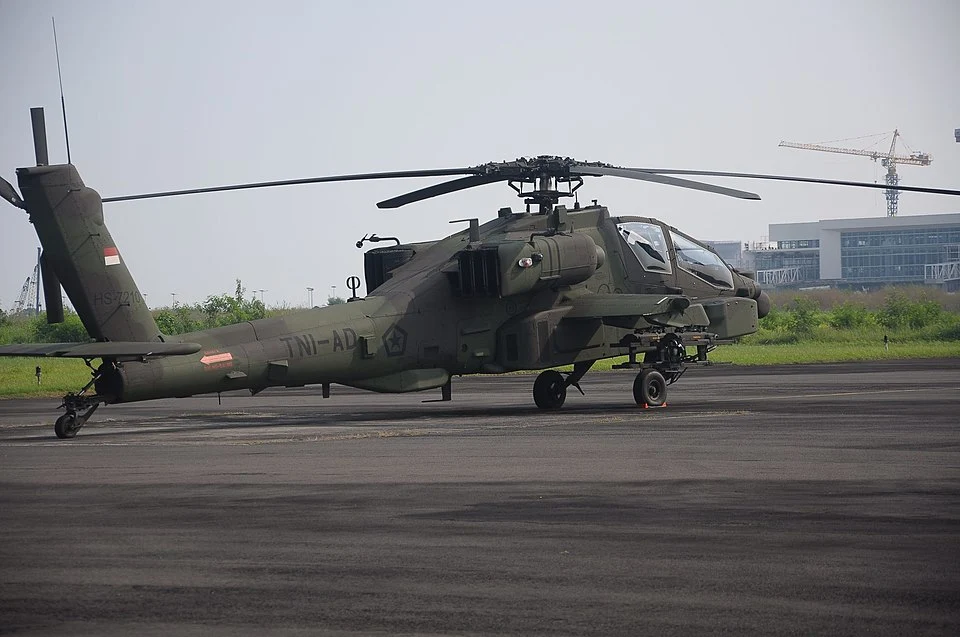The planned delivery of three AH-64E Apache Guardian attack helicopters to the Indian Army has taken an unexpected turn. The Antonov Airlines An-124 cargo aircraft transporting the rotorcraft had to return to the United States with the Apaches still onboard, following an extended stopover in the United Kingdom. A Boeing spokesperson told TWZ that the company was investigating “logistical issues” that had disrupted the transportation process.
The unusual flight activity was first noticed by plane spotter @KiwaSpotter, who reported that the heavy-lift An-124 aircraft, serial number UR-82008, arrived at Mesa Gateway Airport — also known as Phoenix–Mesa Airport — in Arizona on October 30, following a flight from its operating base in Leipzig, Germany.
After being transported from the nearby Boeing facility in Mesa, the Apache helicopters were loaded onto the An-124, which departed the United States on November 1 and flew to East Midlands Airport in England. The helicopters were already painted in their distinctive Indian Army desert camouflage. Photos from the loading process revealed at least one identifiable helicopter, bearing the serial number IA-7105.
The An-124 and its Apache cargo then remained grounded at the British airport for eight days before finally departing — not toward India, but back across the Atlantic to its original departure point, Mesa Gateway Airport, where it landed on November 8. The Apaches were later spotted after being unloaded, being towed with their rotors removed.
The Indian Army received its first batch of three AH-64E helicopters in July this year, as part of a six-aircraft deal valued at $796 million, signed in February 2020 during U.S. President Donald Trump’s visit to New Delhi.
The initial trio was transported aboard an Antonov Airlines An-124 and delivered to Air Force Station Hindon. “These helicopters will significantly boost the operational capabilities of the Army Aviation Corps, particularly in difficult terrain,” Indian Defence Minister Rajnath Singh said at the time.
The AH-64s currently delivered are being used to train crews at Nashik in Maharashtra, home to the Indian Army Aviation Training School. Once training is complete, the Army’s Apache fleet is expected to be based at Nagtalao Army Aviation Base, north of Jodhpur in northwestern India.
The latest batch of three helicopters would have completed the Army’s planned deliveries—had they reached India as scheduled.
When contacted by TWZ for clarification, Boeing offered the following statement:
“We are currently addressing logistical issues caused by external factors to complete the delivery process for the remaining aircraft. We remain closely engaged with the U.S. government and Indian Army and continue working to execute our contract as expeditiously as possible to meet India’s needs and fleet requirements.”

It remains uncertain what exactly caused the issue, or whether it was connected to the Apaches themselves, the An-124 transporting them, or another factor during their long journey to India. The term “logistical issues” could refer to a technical problem involving any of the aircraft, but it might also point to something more routine, such as customs or documentation delays.
There is even the possibility of diplomatic or political complications affecting the transport, though such matters are typically communicated in advance. Unusually, New Delhi has procured AH-64Es for two separate branches of its armed forces. The Indian Air Force previously ordered 22 Apaches, all of which have been delivered without incident.
The current delay in delivery comes at a time when New Delhi has been increasingly open to acquiring new military aircraft from the United States. Recent U.S.-made additions to India’s arsenal include the C-130J Hercules transport aircraft, the CH-47F Chinook heavy-lift helicopter, and the P-8I Neptune maritime patrol aircraft, known locally by that name.
However, U.S.–India relations have experienced noticeable strain in recent months. Within India, doubts have emerged about the United States’ reliability as a strategic partner. Tensions escalated after the April terrorist attack in India and the subsequent India–Pakistan military clash, during which the Trump administration imposed a 50 percent tariff on Indian goods. These measures were widely viewed as expressing U.S. dissatisfaction with India’s continued purchase of Russian oil.
What remains undisputed is the Indian Armed Forces’ urgent need to strengthen their attack helicopter fleet, particularly as they work to counter increasingly advanced threats from both China and Pakistan.
The Boeing spokesperson reiterated to TWZ that the company intends to complete delivery of the remaining Apaches for the Indian Army as quickly as possible. This story continues to develop, and the fate of the three AH-64Es still awaiting delivery remains a key point of focus.
Image Credits- Apache AH-64